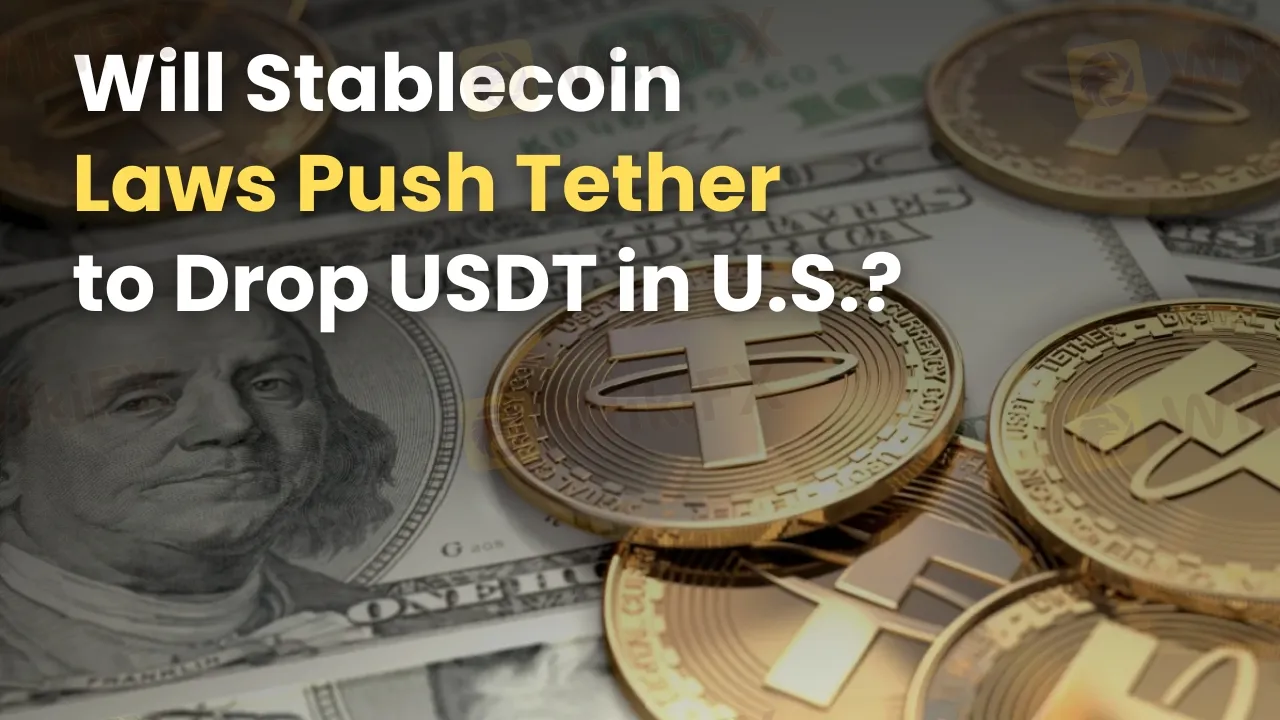简体中文
繁體中文
English
Pусский
日本語
ภาษาไทย
Tiếng Việt
Bahasa Indonesia
Español
हिन्दी
Filippiiniläinen
Français
Deutsch
Português
Türkçe
한국어
العربية
Will Stablecoin Legislation Force Tether to Abandon USDT in the U.S.
Abstract:Tether CEO Paolo Ardoino discusses stablecoin legislation, USDT’s U.S. ban potential, and a new U.S.-compliant stablecoin amid regulatory shifts.

As U.S. stablecoin legislation heats up, the spotlight‘s on Tether, the crypto titan behind USDT, the world’s top stablecoin. With whispers of bans and regulatory hurdles swirling, you‘d expect Tether to feel the squeeze. Not so, says CEO Paolo Ardoino. In a Friday sit-down with Decrypt, he waved off worries about USDT’s U.S. fate, revealing a savvy plan to stay ahead of the curve.
Stablecoins like USDT—pegged to the U.S. dollar—offer crypto traders a steady lifeline, sidestepping volatility without needing fiat cash. Tether‘s USDT, boasting a $144 billion market cap, dominates the space, fueling billions in daily trades. But with U.S. lawmakers drafting strict stablecoin legislation, Tether’s American playbook is under scrutiny.
Ardoino‘s counter? A fresh U.S.-tailored stablecoin designed to fit pending regulations. “We believe that our main stablecoin is perfected for emerging markets, but we can craft a payment stablecoin that works for the U.S.,” he explained. “We need to have two products with two different value propositions.” It’s a strategic pivot, balancing Tethers global reach with a nod to U.S. compliance.

On Capitol Hill, the House‘s STABLE Act and Senate’s GENIUS Act are racing forward, both eyeing foreign issuers like Tether, based in El Salvador. The bills demand adherence to anti-money laundering rules under the Bank Secrecy Act and deep reserve audits—pain points for Tether‘s critics. The company dodged a full audit, sparking years of debate over USDT’s backing. Some bet Tether would flee the U.S. rather than comply.
Ardoino fires back, claiming Tether leads in compliance, especially with law enforcement ties. He‘s in talks with “Big Four” firms for an audit, though their caution mirrors the stablecoin frontier’s uncertainty. Scoffing at rivals banking on Tether‘s U.S. retreat, he quipped it’s “the smell of desperation.” Tether‘s not folding—it’s fighting.
Speaking from Cantor Fitzgerald‘s New York hub—where the firm, tied to U.S. Commerce Secretary Howard Lutnick, guards Tether’s Treasuries—Ardoino radiated resolve. Yet, he‘s not tweaking USDT for U.S. rules. His focus stays on emerging markets, where USDT thrives. “We don’t think there is anything particularly problematic” with the bills, he said, brushing off the regulatory buzz.
He‘s optimistic USDT will linger in U.S. secondary markets, vital for remittances. The Senate bill limits non-compliant issuers from direct U.S. sales, while the House’s tougher stance bans trades on platforms like Coinbase two years after enactment. Lawmakers must align these drafts before a bill lands with President Donald Trump—if it clears Congress.
Neither bill targets non-custodial DeFi trades on platforms like Uniswap, a potential USDT loophole. Still, Tether‘s felt regulatory ripples elsewhere—Binance axed USDT in Europe over EU rules. Ardoino’s fix? Backing compliant local stablecoins, a tactic hes echoing in the U.S.
Long-term, he sees USDT stepping back from U.S. and European dominance, rooted instead in emerging markets. For now, Tether‘s tackling stablecoin legislation head-on, blending a new U.S. stablecoin with USDT’s global clout. It‘s a high-stakes dance, but Ardoino’s betting Tethers got the moves to outlast the skeptics.

Disclaimer:
The views in this article only represent the author's personal views, and do not constitute investment advice on this platform. This platform does not guarantee the accuracy, completeness and timeliness of the information in the article, and will not be liable for any loss caused by the use of or reliance on the information in the article.
Read more

Global Stablecoin Regulation Enters New Phase as U.S. Senate Approves Landmark Bill
The U.S. Senate has passed the GENIUS Act, a historic move to regulate stablecoins pegged to the U.S. dollar. As the world’s major economies race to define legal frameworks for digital currencies, this vote marks a pivotal moment—one that echoes Europe’s MiCA rules and mirrors regulatory shifts in Asia.

Philippines Sets Southeast Asia’s First Crypto Regulatory Framework
Philippines launches pioneering crypto regulations, enhancing investor protection and market transparency with strict rules for CASPs.

Tether Freezes $12.3 Million in USDT Over Money Laundering Concerns
Tether freezes $12.3 million in USDT on Tron blockchain, reinforcing its anti-money laundering efforts and compliance with U.S. Treasury sanctions.

MiCA Unlocks EU Crypto Market, but National Tensions Rise as Gemini and Coinbase Near Approval
Gemini and Coinbase are poised to become the first major crypto firms licensed under the EU’s MiCA regulation, opening the door to 27-country access. But the fast pace of approvals in some countries—like Malta and Luxembourg—has triggered concerns among regulators about uneven oversight and the risk of regulatory arbitrage.
WikiFX Broker
Latest News
ZFX: A Closer Look at Its Licences
XM Rolls Out New Forex Trading Competition Platform for 2025
Should you buy or sell US dollars in the next three to six months?
Tradehall Broker Review 2025: Read Before Trade
Inside MBI: The Billion-Dollar Ponzi Scheme That Shook Malaysia
Danske Bank expects the European Central Bank to make its final interest rate cut in September.
Retirement Dreams Shattered: Don't Do This To Yourself!
EU Regulators Imposed Over €71M in Sanctions in 2024, ESMA Calls for Enforcement Convergence
No Regulation, Revoked Licence: Is Tradehall Safe to Use?
Philippines Sets Southeast Asia’s First Crypto Regulatory Framework
Currency Calculator


